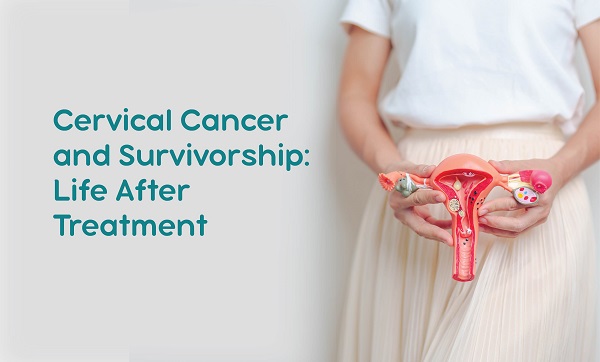Dr. Manasi Shah, a leading cervical cancer specialist in Ahmedabad,
stresses that each survivor’s journey is unique, and care plans should be tailored to
individual needs.
Physical Health After Treatment:
-
Follow-Up Care: Regular follow-up appointments with your healthcare team are crucial. These visits help monitor your health, manage any side effects of treatment, and detect any signs of recurrence early. Dr. Manasi Shah advises that follow-up care typically involves physical exam, pap tests and imaging tests as needed.
- Managing Side Effects: Treatments like surgery, radiation, chemotherapy can cause various side effects, both short- term and long term. Common issues include fatigue, lymphedema (swelling caused by lymph fluids), and changes in bowel function or bladder. Your cancer doctor in Ahmedabad can provide strategies and treatments to manage these symptoms effectively.
- Healthy Lifestyle: Adapting a healthy lifestyle is vital for recovery and overall well- being. This include eating a balanced diet, engaging in regular physical activity, and avoiding tobacco and excessive alcohol. A healthy lifestyle can boost our immune system, improve your mood, and reduce the risk of other health problems.
- Sexual Health: Treatments for cervical cancer can affect your sexual health and intimacy. It’s common to experience changes in sexual function, such as vaginal dryness or discomfort during intercourse. Open communication with your partner and seeking advice from your doctor can help address these issues. Dr. Manasi Shah recommends consulting a specialist if needed to explore treatments and therapies that can help.
Emotional and Mental Health:
-
Coping with Emotions: It’s normal to experience a range of emotions after treatment, including relief, anxiety, depression, and fear of recurrence. Talking to a mental health professional, joining a support group, or connecting with other survivors can provide valuable support and coping strategies.
- Post-Traumatic Growth: Many survivors find that their experience with cancer leads to personal growth and a renewed perspective on life. This can include a greater appreciation for life, improved relationships, and a stronger sense of purpose. Embracing these changes can positively impact your mental health.
- Support Systems: Building a strong support system is crucial. This includes family, friends, healthcare providers, and support groups. Dr. Manasi Shah suggests the importance of open communication with your loved ones about your needs and feelings.
Social and Practical Aspects:
-
Returning to Work: Resuming work can be a significant step in regaining a sense of normalcy. It’s important to communicate with your employer about any limitations or accommodations you may need. Dr. Manasi Shah advises that many survivors gradually return to work and find ways to balance their professional and personal lives.
- Financial Considerations: The financial impact of cancer treatment can be significant. It’s important to explore resources and support programs that can help manage medical bills and other expenses. Social workers and financial counselors can provide assistance and guidance.
- Maintaining Relationships: Cancer can affect your relationships with family and friends. Open communication and mutual support are key to maintaining strong connections. It’s also important to set boundaries and prioritize your well-being.
Long-Term Health Monitoring:
-
Risk of Recurrence: While the risk of recurrence varies, regular monitoring and follow-up care are essential. Dr. Manasi Shah emphasizes the importance of adhering to your follow-up schedule and reporting any new symptoms to your healthcare team promptly.
- Secondary Cancers: Survivors of cervical cancer may have an increased risk of developing other types of cancer due to treatment or shared risk factors. Regular screenings and a healthy lifestyle can help mitigate this risk.
- Chronic Health Conditions: Treatments for cervical cancer can sometimes lead to chronic health conditions such as heart disease or osteoporosis. Regular check-ups and preventive care are crucial to managing these conditions.
Tips for Healthy Lifestyle:
-
Stay Informed: Educate yourself about cervical cancer and its potential long-term effects. Knowledge empowers you to make informed decisions about your health.
- Seek Support: Don’t hesitate to seek support when you need it. Whether it’s talking to a mental health professional, joining a support group, or leaning on friends and family, support is crucial for emotional and mental well-being.
- Practice Self-Care: Prioritize self-care activities that bring you joy and relaxation. This can include hobbies, meditation, yoga, or spending time in nature.
- Stay Active: Regular physical activity can improve your physical and mental health. Find activities you enjoy, whether walking, swimming, or dancing, and make them a part of routine.
- Healthy Eating: A balanced diet rich in fruits, vegetables, whole grains, and lean proteins supports overall health and recovery. Consider consulting a nutritionist for personalized dietary advice.
- Regular Check-Ups: Keep up with regular medical check-ups and screenings as recommended by your healthcare team. Early detection of any issues can lead to better outcomes.
- Open Communication: Maintain open communication with your healthcare team about any concerns or symptoms you experience. Early intervention can make a significant difference in managing health issues.
- Set Realistic Goals: Set achievable goals for your recovery and overall well-being. Celebrate your progress and be patient with yourself as you navigate this new phase of life
Life after cervical cancer treatment is a journey of recovery, resilience, and renewal. With the support of healthcare professionals like Dr. Manasi Shah, a leading cervical cancer specialist in Ahmedabad, survivors can navigate this phase with confidence and hope. By focusing on physical health, emotional well-being, and practical aspects of daily life, survivors can embrace a fulfilling life after cancer. Remember, each day is a step forward, and with the right support and self-care, a bright and healthy future is within reach.
